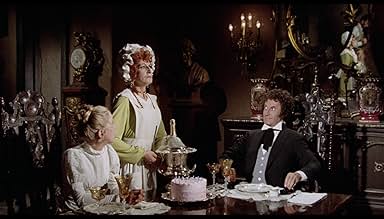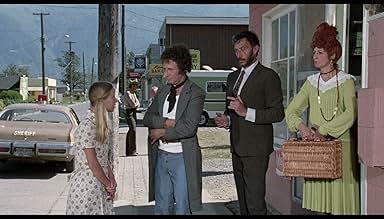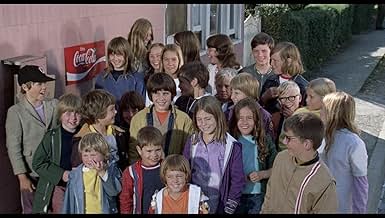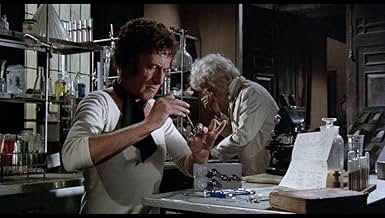Aggiungi una trama nella tua linguaA mute puppeteer uses a deceased scientist's invention to control dead bodies like puppets.A mute puppeteer uses a deceased scientist's invention to control dead bodies like puppets.A mute puppeteer uses a deceased scientist's invention to control dead bodies like puppets.
- Regia
- Sceneggiatura
- Star
- Candidato a 1 Oscar
- 1 candidatura in totale
Recensioni in evidenza
Maybe some of the all american readers of IMDb will be insulted by my establishing a certain degree of comparision between this gem of a horror movie and Jackie Gleason's emotionally charged melodrama 'Gigot'. Well, if so, I ask for your pardon in advance, and state that, on no account, is my intention to offend you in any ways.
Nevertheless, the way I envision, this brilliant movie, 'Shanks' is a clever - if unintentional - satire of what would Gleason's Gigot do if he was an actual human being - after all, a man that wonderfully good could not be from this foul Earth of ours.
Marcel Marceau is a deaf mute aspiring to be a puppeteer whose existence is torn to shreds by his shrewish sister and drunken brother in law. Here, the shades of Gigot appear, since Jackie Gleason's character is constantly taunted - not by family, but by acquaintances who share the same street and later on, a woman, with whom he desperately falls in love.
Marceu is invited to work with a dying scientist working on a project to reanimate the dead. When he dies, Marceau uses the techniques trusted to him by his mentor to re-animate him as well. He has a lot of fun improving his work, and controlling his every move through a small remote control. That way he actually becomes more of a puppeteer than ever - only now, his manipulating powers are aimed towards the dead.
His vengeance towards his sister and brother in law are rather obvious, but frightening, nevertheless. He murders them - and deprives them from the little decency that exists in 'dying', by manipulating them, just like they manipulated him, when living. He leads the dead bodies around with morbid pleasure, and degrades them as much as he can, therefore, satisfying his justifiable yearnings. Yet, things begin the go sour after his protegee - a young adolescent whose character bears much of the little girl in 'Gigot' - discovers that those people that are constantly walking down the streets if the small town they live in, are, in fact, dead.
The movie's punch is lost in the ending, when the evil outside Marceau's world of vengeance - represented by a group of hilariously named Hell's Angels - encroaches on the little girl's birthday party. But the ending that examines the possibilities of the entire plot being a dark fantasy that Marceau has while performing for the town's children is absolutely fascinating.
Alex North's musical score replaces the lack of dialog with thorough efficiency. The ragtime and Charleston pieces North has composed for the few scenes in which Marceau's human puppets are performing for the little girl are absolutely brilliant, yet, never do they curtail the morbidness the film bears.
Gigot's vendetta is now, a refreshing reality. Yet, through another movie, 'Shanks', a brilliant, disturbingly delicious study in irony, reality, fantasy, and revenge.
Do forgive for the comparisions. I reiterate that they were not intended to harm any of you Jackie Gleason junkies out there, in any ways... :)
Nevertheless, the way I envision, this brilliant movie, 'Shanks' is a clever - if unintentional - satire of what would Gleason's Gigot do if he was an actual human being - after all, a man that wonderfully good could not be from this foul Earth of ours.
Marcel Marceau is a deaf mute aspiring to be a puppeteer whose existence is torn to shreds by his shrewish sister and drunken brother in law. Here, the shades of Gigot appear, since Jackie Gleason's character is constantly taunted - not by family, but by acquaintances who share the same street and later on, a woman, with whom he desperately falls in love.
Marceu is invited to work with a dying scientist working on a project to reanimate the dead. When he dies, Marceau uses the techniques trusted to him by his mentor to re-animate him as well. He has a lot of fun improving his work, and controlling his every move through a small remote control. That way he actually becomes more of a puppeteer than ever - only now, his manipulating powers are aimed towards the dead.
His vengeance towards his sister and brother in law are rather obvious, but frightening, nevertheless. He murders them - and deprives them from the little decency that exists in 'dying', by manipulating them, just like they manipulated him, when living. He leads the dead bodies around with morbid pleasure, and degrades them as much as he can, therefore, satisfying his justifiable yearnings. Yet, things begin the go sour after his protegee - a young adolescent whose character bears much of the little girl in 'Gigot' - discovers that those people that are constantly walking down the streets if the small town they live in, are, in fact, dead.
The movie's punch is lost in the ending, when the evil outside Marceau's world of vengeance - represented by a group of hilariously named Hell's Angels - encroaches on the little girl's birthday party. But the ending that examines the possibilities of the entire plot being a dark fantasy that Marceau has while performing for the town's children is absolutely fascinating.
Alex North's musical score replaces the lack of dialog with thorough efficiency. The ragtime and Charleston pieces North has composed for the few scenes in which Marceau's human puppets are performing for the little girl are absolutely brilliant, yet, never do they curtail the morbidness the film bears.
Gigot's vendetta is now, a refreshing reality. Yet, through another movie, 'Shanks', a brilliant, disturbingly delicious study in irony, reality, fantasy, and revenge.
Do forgive for the comparisions. I reiterate that they were not intended to harm any of you Jackie Gleason junkies out there, in any ways... :)
And that's not an exaggeration. I searched for this movie for a long time, and I'm glad I found it. Marcel Marceau plays Shanks, a deaf puppet maker, and Walker, an old scientist who has discovered the secret of reanimating the dead. He plays both beautifully, using his pantomime skills to achieve silent movie style acting. In fact, that's what this movie reminds me of - a silent fairy tale (the use of title cards to introduce scenes further suggests this), with a little George Romero thrown in! It's incredible that something this abstract and individualistic was made; I wish more movies would be as bold. The opening credits sequence, with tinted photos of kids watching Shanks' puppet show while the weird Oscar nominated (!) music plays is incredibly strange, memorable, and disturbing.
William Castle, of all people, directed. This movie shows, more than any other, that he was more than just the "King of Gimmicks". To see such an expressionistic and disturbing vision.......is to regret that this was his final film as director.
William Castle, of all people, directed. This movie shows, more than any other, that he was more than just the "King of Gimmicks". To see such an expressionistic and disturbing vision.......is to regret that this was his final film as director.
Here is a film I had wanted to see for some time and finally tracked down a low-quality bootleg video of. I am quite a fan of unusual films like this, although unlike the works of David Lynch or Alejandro Jodorowsky, the weirdness of this film comes naturally from the storyline and not from any intentional strangeness just for the sake of strangeness. William Castle has created a neat, compact, self-contained movie universe here, with the setting being an odd juxtaposition between a dark Gothic castle and sunny Northern California. I couldn't help but be reminded of Tim Burton's "Edward Scissorhands", another modern fairy tale about a mad but gentle genius and his near-mute misfit assistant in a dark old castle surrounded by a sunny '50s style suburbia. In fact, call me crazy, but I will bet that Burton has seen this film before and was possibly inspired by it while making his own film. There are other similarities to that film: the genius dies leaving the misfit to fend for himself in the outside world, the villains are in a motorcycle gang, the misfit falls for a local blond teenage girl, and he also performs his "magic" for children in a school classroom. Also like the films of Burton, there is a mixture of visual motifs from the past and present, including silent-movie style story-cards, Alex North's heady music score, and a motorcycle gang.
Sadly missing, though, is a highly compelling storyline, but in this case style over substance is not such a bad thing. This film is hard to classify, as it is not completely horror, modern fairy tale, or art film. I think it would be best to classify it as an experimental curio - one of those films like "Eraserhead", Jacques Tati's "Playtime", "Cabinet of Dr. Caligaryi", or "El Topo", which have no conventional film equivalent yet continue to garner a following from a small group of adventurous filmgoers. If you are attracted to films such as these, you will not be disappointed with "Shanks."
Sadly missing, though, is a highly compelling storyline, but in this case style over substance is not such a bad thing. This film is hard to classify, as it is not completely horror, modern fairy tale, or art film. I think it would be best to classify it as an experimental curio - one of those films like "Eraserhead", Jacques Tati's "Playtime", "Cabinet of Dr. Caligaryi", or "El Topo", which have no conventional film equivalent yet continue to garner a following from a small group of adventurous filmgoers. If you are attracted to films such as these, you will not be disappointed with "Shanks."
Shanks (1974)
*** (out of 4)
Leave it to William Castle, the ultimate trick master, to save his strangest film for last but that's pretty much what he's done with SHANKS. In the film, Marcel Marceau plays a deaf puppet master who takes over for his scientist friend in a bizarre experiment that allows one to control the dead like you would a puppet. Soon the once abused man becomes in control of everything he's ever wanted. This is a pretty bizarre little movie and I can't imagine it being a big disaster when originally released because it's doubtful too many horror fans wanted to see a horror movie without any violence, blood, spooks or anything like that. Instead of going for cheap thrills, Castle has instead pretty much created a film that is all atmosphere and there's so little dialogue that one could nearly call this a silent film. We even get title cards to explain some of the action so it's extremely close to being a silent. Castle's direction handles the material incredibly well and I'd probably argue that this is perhaps his best made movie. There aren't any gimmicks or tricks being thrown out and instead Castle appears to be wanting to prove to critics that he was able of creating a movie without them. The atmosphere of the film is incredibly thick as it really does seem like you're watching something that doesn't take place on Earth or set during any particular time period. Famous mime Marceau is excellent in his role and really delivers a remarkable performance. His turn at playing this mute is without question one of the best I've seen from any actor as he doesn't have one false step and there's never a single second where it seems like we're just seeing an actor play a deaf man. Tsilla Chelton and Philippe Clay are also excellent especially when they're the "puppets" as it was quite amazing to watch them do their thing. The cute Cindy Eilbacher is the perfect mix to be a friend to Marceau. This isn't a very well known movie, which is a shame but part of this might be due to the fact that it has yet to ever get an official release. Hopefully one day it will get a wider release and people will give the film a second shot because it certainly deserves it and I can't help but think had it been made somewhere between the 40s and the 60s then it would be looked at as a minor classic. Being lost in the 70s, the film is in major need of rediscovery.
*** (out of 4)
Leave it to William Castle, the ultimate trick master, to save his strangest film for last but that's pretty much what he's done with SHANKS. In the film, Marcel Marceau plays a deaf puppet master who takes over for his scientist friend in a bizarre experiment that allows one to control the dead like you would a puppet. Soon the once abused man becomes in control of everything he's ever wanted. This is a pretty bizarre little movie and I can't imagine it being a big disaster when originally released because it's doubtful too many horror fans wanted to see a horror movie without any violence, blood, spooks or anything like that. Instead of going for cheap thrills, Castle has instead pretty much created a film that is all atmosphere and there's so little dialogue that one could nearly call this a silent film. We even get title cards to explain some of the action so it's extremely close to being a silent. Castle's direction handles the material incredibly well and I'd probably argue that this is perhaps his best made movie. There aren't any gimmicks or tricks being thrown out and instead Castle appears to be wanting to prove to critics that he was able of creating a movie without them. The atmosphere of the film is incredibly thick as it really does seem like you're watching something that doesn't take place on Earth or set during any particular time period. Famous mime Marceau is excellent in his role and really delivers a remarkable performance. His turn at playing this mute is without question one of the best I've seen from any actor as he doesn't have one false step and there's never a single second where it seems like we're just seeing an actor play a deaf man. Tsilla Chelton and Philippe Clay are also excellent especially when they're the "puppets" as it was quite amazing to watch them do their thing. The cute Cindy Eilbacher is the perfect mix to be a friend to Marceau. This isn't a very well known movie, which is a shame but part of this might be due to the fact that it has yet to ever get an official release. Hopefully one day it will get a wider release and people will give the film a second shot because it certainly deserves it and I can't help but think had it been made somewhere between the 40s and the 60s then it would be looked at as a minor classic. Being lost in the 70s, the film is in major need of rediscovery.
I am sure the cult followers of this film will not like my review, but that's partly what makes this film a cult classic--either you like it or you don't. Even with nothing else to do on a late Friday night, and a stiff drink, a bag of chips, and the need to escape from the cares of the week, I found myself flipping to other channels during the painfully slow segments of this film. The (un)editing and overall incredibly slow flow of this story made it a struggle to stay tuned in. If properly edited, it could have easily been a half-hour "Tales from the Dark Side." In fact, the quality of the shots and lighting made me convinced that it was a made-for-TV film.
All that said, it's interesting to see the movie once, as if it was assigned in a "70s film appreciation" class. But be prepared with something else to do--like sorting receipts for taxes, or playing solitaire.
You may find yourself yelling at the screen--"How many times does the editor have to cut back to his face? We've got the point! Now move on with the action!!!" and, "could he walk down that hallway any slower???" My favorite part of the movie was watching the great body movement of the actors who played the re-animated zombies. And it's funny that Marcel was NOT the best one of these!
All that said, it's interesting to see the movie once, as if it was assigned in a "70s film appreciation" class. But be prepared with something else to do--like sorting receipts for taxes, or playing solitaire.
You may find yourself yelling at the screen--"How many times does the editor have to cut back to his face? We've got the point! Now move on with the action!!!" and, "could he walk down that hallway any slower???" My favorite part of the movie was watching the great body movement of the actors who played the re-animated zombies. And it's funny that Marcel was NOT the best one of these!
Lo sapevi?
- QuizAlex North used parts of his rejected score for 2001: Odissea nello spazio (1968) for this film. For example, the main title music was originally composed for the space station phone call sequence of 2001, but here rearranged with a female vocalist added.
- BlooperAfter Mrs. Barton moves Celia's placemat, Malcolm cocks her body to her left. In the following shot, she's cocked to her right.
- Curiosità sui creditiRight before the closing credits roll, a quote from William Makepeace Thackeray is featured: "Let us shut up the box and the puppets, for our play is played out."
- ConnessioniFeatured in Spine Tingler! The William Castle Story (2007)
I più visti
Accedi per valutare e creare un elenco di titoli salvati per ottenere consigli personalizzati
- How long is Shanks?Powered by Alexa
Dettagli
Contribuisci a questa pagina
Suggerisci una modifica o aggiungi i contenuti mancanti



























